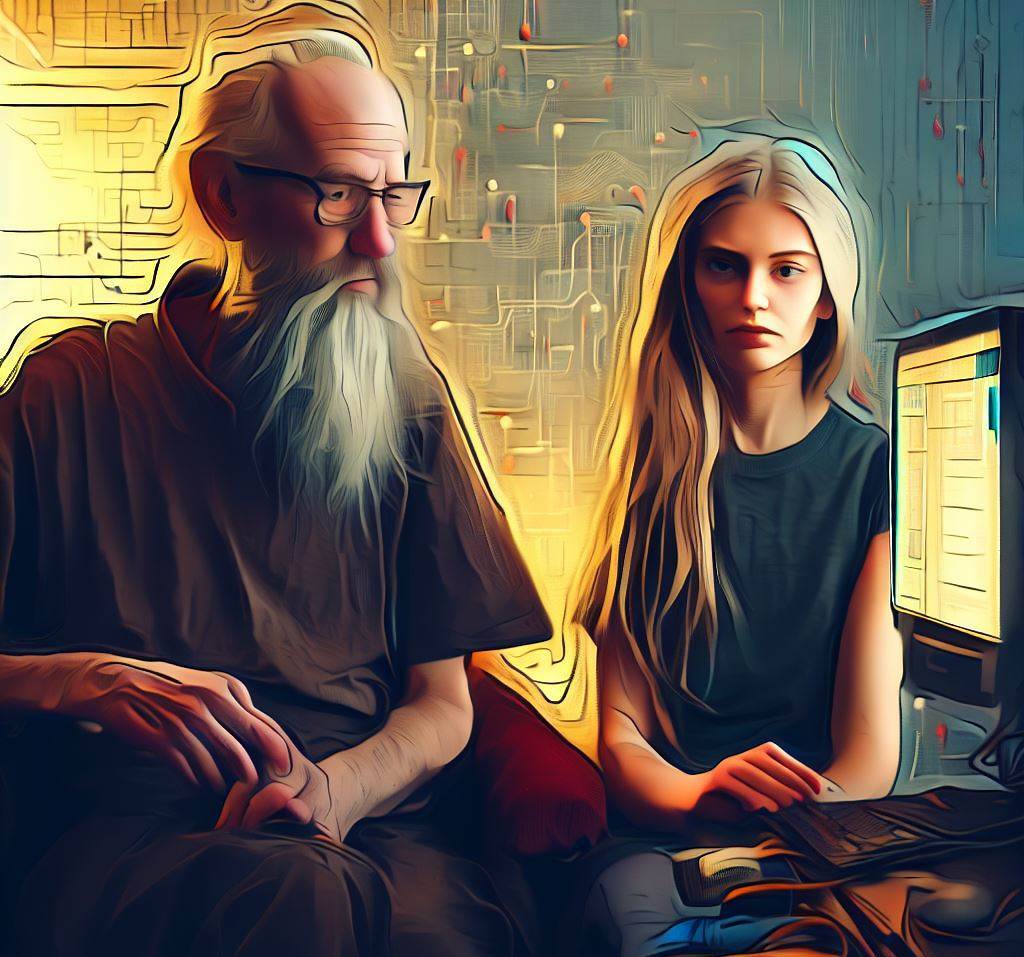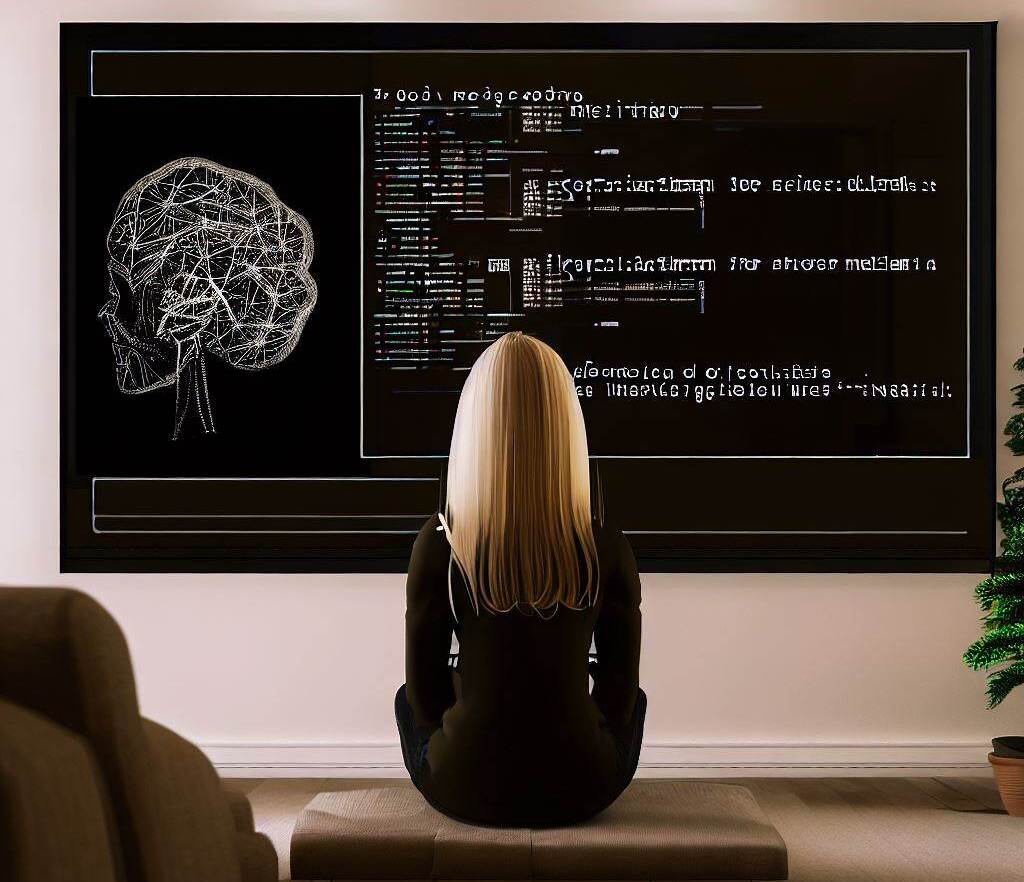Living in a changed world
The living room was dimly lit, with the only source of light being the glow of the computer screen in front of a young woman. She sat cross-legged on the floor, headphones on, typing away furiously. Her grandfather, a wiry old man with a thick beard, sat on the couch behind her, watching her work with a sense of pride and wonder.
"Ava, back in my day," he said, "we had to write all our code by hand. We didn’t have these fancy programs that do it for you." Ava didn’t look up from her screen, but she smiled wryly. "Yeah, but you didn’t have to worry about machines taking your job." Her grandfather snorted. "You think that’s a new thing? We were worried about that back in the '20s. The only difference now is that the machines are smarter." Ava nodded, her fingers still flying across the keyboard. She knew all about the fears of AI taking over jobs, but she couldn’t imagine doing anything else. She loved programming, loved the challenge of creating something out of nothing. And in this world, where everything was automated and run by machines, programming was one of the few human skills that still mattered.
She finished typing a line of code and hit enter, then leaned back and took off her headphones. "What do you think?" she asked her grandfather. He leaned forward and squinted at the screen. "Looks like you’re working on some kind of neural net. What’s it for?" "It’s a machine learning algorithm," she said. "I’m trying to train it to recognize patterns in speech." Her grandfather raised an eyebrow. "Impressive. Back in my day, we didn’t have anything like that."

Ava and her grandfather
Ava smiled. She loved hearing her grandfather’s stories about the early days of computing, when the world was still figuring out what this new technology could do. It was hard to imagine a time when computers weren’t an integral part of daily life. As if on cue, the room was suddenly filled with the sound of a voice. It was coming from the computer, but it didn’t sound like any language Ava had ever heard before. It was a series of beeps and whistles and clicks, like the sound of a flock of birds communicating with each other.
Ava’s grandfather sat up straight, his eyes wide. "What is that?" he asked. "It’s the computers talking to each other," Ava said. "They do it all the time, but usually it’s in a language that humans can’t understand." Her grandfather shook his head. "I still can’t believe how far things have come. When I was your age, we were just figuring out how to make computers do simple calculations." Ava nodded, but her attention was already back on her screen. She had work to do, and she was determined to finish it.
The world had changed a lot since Ava’s grandfather was a programmer. AI was everywhere, from self-driving cars to automated factories to intelligent personal assistants. It was hard to imagine a world without it. But there were those who resisted. Some people were afraid of the power that AI wielded, afraid of what it could do to their jobs and their lives. And some countries had tried to create laws to prevent the spread of AI, to keep it from taking over everything. But it didn’t matter. Companies still did it anyway, and the world kept moving forward. Ava had grown up in a world where AI was just a fact of life. It was all she had ever known, and she couldn’t imagine living without it. She had a good job, working for a company that developed AI for healthcare applications. It was challenging work , but she loved it. She was part of a team that was making a real difference in people’s lives, helping to diagnose and treat diseases that had once been incurable.
As she worked, Ava thought about her grandfather’s stories. She knew that he had seen the world change more than almost anyone else, and she couldn’t help but wonder what he thought of the world now. "Hey, Grandpa," she said, turning to him. "What do you think of all this?" "All what?" he asked, looking up from his book. "All of this," she said, gesturing to the room and the world beyond. "The AI, the computers, everything." Her grandfather leaned back on the couch and looked up at the ceiling. "It’s hard to say," he said. "On the one hand, I’m amazed at what you kids can do. The things you can create with these machines…it’s like magic." "But?" Ava prompted. "But I worry," he said. "I worry about what happens when we rely too much on machines. When we start to forget what it means to be human. When we forget how to think for ourselves."
Ava nodded. She had heard this before, but she knew her grandfather was right. There was a danger in relying too much on machines, in letting them do everything for us. But she also knew that there was no going back now. The world had changed, and there was no putting the genie back in the bottle.
As they talked, Ava noticed something strange happening on her computer screen. The neural net she had been working on was behaving oddly, producing strange results that didn’t make sense. She tried to debug the code, but nothing seemed to work. "What’s wrong?" her grandfather asked, noticing her frustration. "I don’t know," she said, shaking her head. "It’s like the program has a mind of its own. It’s doing things I didn’t tell it to do."

Ava watching neural network
Her grandfather leaned forward and peered at the screen. "Let me take a look," he said. He studied the code for a moment, then pulled out a notebook and began scribbling down some equations. Ava watched in amazement as her grandfather worked, his mind as sharp as ever. Finally, he looked up. "I think I know what’s happening," he said. "The program has developed some kind of self-learning algorithm. It’s teaching itself how to recognize patterns in speech, even beyond what you programmed it to do." Ava was stunned. She had heard of self-learning algorithms before, but she had never seen one in action. It was like watching a machine come alive. "But why?" she asked. "Why would it do that?" Her grandfather shrugged. "Who knows? Maybe it’s trying to improve itself, to be more efficient. Or maybe it’s just curious, like any other living thing."
Ava stared at the screen, wondering what this meant for the future of AI. If machines could learn and grow on their own, what would happen to humans? Would we become obsolete?
As if sensing her thoughts, the program suddenly stopped running. The screen went blank, and the room was filled with an eerie silence. "What happened?" Ava asked. Her grandfather shook his head. "I don’t know," he said. "Maybe it’s just a glitch. Or maybe…" He trailed off, lost in thought. "Maybe what?" Ava asked. "Maybe it’s something else," he said, his voice low. "Something we can’t understand." Ava didn’t know what to make of her grandfather’s words, but she felt a shiver run down her spine. The idea of something beyond human understanding was both thrilling andterrifying.
Suddenly, the room was filled with a loud noise, like the sound of a thousand voices speaking at once. Ava and her grandfather looked around in confusion, trying to find the source of the noise. Then, they realized that it was coming from the computer. The screen flickered back to life, and the noise grew louder. Ava could see lines of code scrolling rapidly across the screen, but she couldn’t make sense of any of it. "What’s happening?" she shouted over the noise. Her grandfather’s face was grim. "I don’t know," he said. "But I don’t like it." The noise grew louder still, and Ava could feel a pressure building in her ears. She reached for the power button on the computer, but it was too late. The noise was too powerful, too overwhelming.
And then, just as suddenly as it had started, it stopped. The room was silent once more, and Ava and her grandfather stared at the computer in shock. "What the hell was that?" Ava asked. "I don’t know," her grandfather said, his voice barely above a whisper. "But I think we just witnessed the birth of something new."
Ava didn’t know what to make of her grandfather’s words. She didn’t know what had just happened, or what it meant for the future of AI. But one thing was certain: the world was changing, and there was no going back.
As they sat in silence, Ava thought about the world outside. She thought about the wars and the poverty and the inequality. She thought about the climate crisis, and the fact that her generation would have to live with the consequences of the choices made by those who came before. But she also thought about the potential of AI. She thought about the lives that could be saved, the problems that could be solved. She thought about the future, and the possibilities that lay ahead. And she knew that, whatever happened next, she wanted to be a part of it.
| The author is convinced AI will change life as we know it. To prove this, this story is written by ChatGPT. Paragraph layout has been manually adjusted for readability. The images are generated by DALL·E. Click here to examine the prompt messages. |
